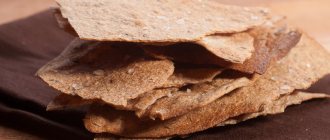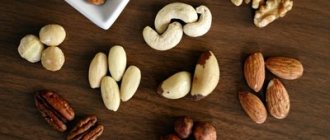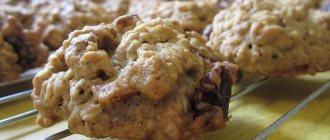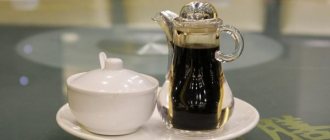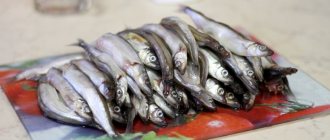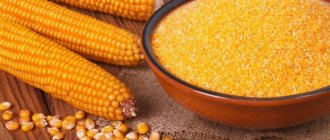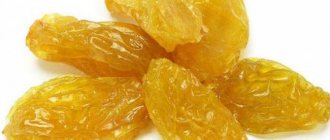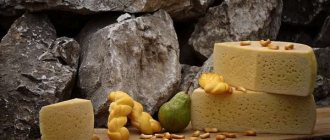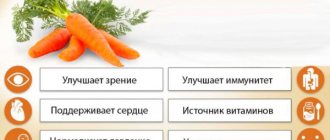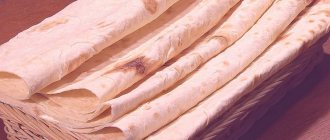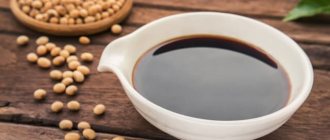When following a dietary regimen, the body must receive a sufficient amount of proteins, carbohydrates, fats, micro- and macroelements, vitamins, but it is important that the energy value of the diet is not excessive. With the right approach, the diet menu can be complete and varied.
The list of healthy products includes boiled corn. Cereals contain practically no fat, but are rich in proteins and carbohydrates that the body needs to be full. In addition, the composition contains large quantities of plant fiber, which activates digestion, regulates energy metabolism, cleanses the gastrointestinal tract, removes excess fluid, which promotes weight loss.
Below we will look at the composition, harm and benefits of boiled corn for the body and separately for weight loss, consumption rates, cooking features, what products can be combined with and what are the contraindications.
Boiled corn
The culinary possibilities of corn are great. Freshly harvested cobs are ready to eat, but they prefer to be boiled . Due to its low calorie content and the presence of nutritional components, boiled corn is not only included in the list of permitted foods for weight loss, but is also used as the main ingredient in a diet program.
The corn diet is based on the inclusion in the diet of boiled ears of fresh young corn in the summer, and corn porridge cooked in water without sugar and salt the rest of the time.
There are various variations of the corn diet , differing in duration and the ability to include other foods in the diet.
A mono-diet is a strong stress factor for the body, as it is characterized by an unbalanced diet and insufficient intake of nutrients into the body. Therefore, the best option for correcting body weight is a physiologically complete, varied diet, limiting junk food and consuming healthy foods, including boiled corn.
Reference. For the purpose of losing weight, do not use canned corn grains, flakes, corn sticks, or popcorn, which is associated with the addition of sugar, salt, and other harmful substances to these products and the loss of its nutritional properties.
Composition, properties, vitamins and minerals
Corn contains a variety of components that determine its beneficial properties , provide human physiological needs for basic nutrients and serve as an energy supplier.
Chemical composition of yellow boiled corn:
- water;
- alimentary fiber;
- digestible carbohydrates: starch, glucose, sucrose, maltose, fructose, mono- and disaccharides;
- nonessential and essential amino acids;
- saturated fatty acids: stearic, palmitic;
- polyunsaturated fatty acids: linoleic, linolenic, omega-3 and omega-6 fatty acids;
- beta carotene;
- vitamin A;
- B vitamins: B1, B2, B4, B5, B6, B9, B12;
- vitamin C;
- vitamin D;
- vitamin E;
- vitamin H;
- vitamin K;
- vitamin PP;
- macroelements: calcium, potassium, phosphorus, magnesium, sodium;
- trace elements: copper, iron, manganese, zinc, selenium.
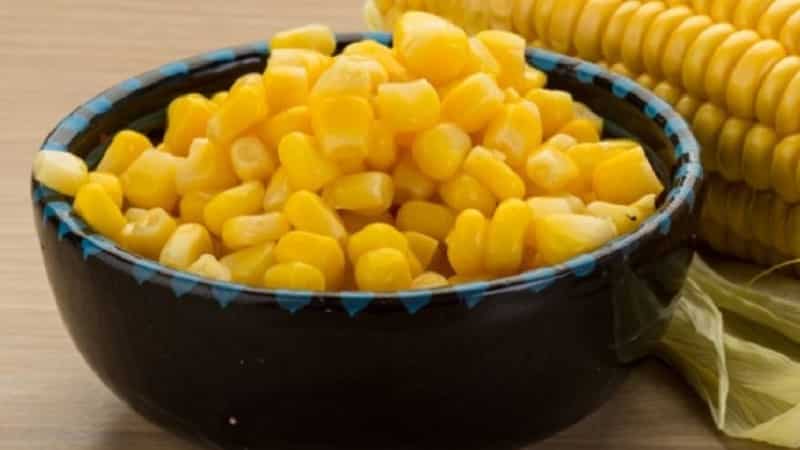
A person can regularly, but in moderation, consume boiled corn . It provides the need for potassium and magnesium, which contribute to the functioning of the conduction system of the heart, stabilize blood pressure, determine the transmission of excitation from nerve cells, and participate in the regulation of protein and carbohydrate metabolism.
Corn is a source of calcium , the biochemical role of which is in the construction and formation of bone tissue, mineralization of teeth, the processes of transmission of nerve impulses, muscle contractions, and blood clotting. You cannot ignore the phosphorus present in the composition. It, in turn, actively helps calcium in the processes of mineralization of bone tissue, supports the normal course of energy metabolism, and normalizes the acid-base balance.
Boiled corn is recommended as an additional source of such micro- and macroelements:
- Iron . Necessary for the normal operation and functioning of the nervous and digestive systems, tissue respiration, and bone formation.
- Copper . A good antioxidant, participates in the synthesis of collagen fibers, strengthens the walls of blood vessels, is useful for the prevention of hypoxia, anemia, osteoporosis (reduces bone density).
- Zinc . It has an immunomodulatory effect, stimulates hair growth and restoration, and promotes the absorption of vitamin A.
- Manganese . Protects cells from damage by oxygen radicals, reduces cholesterol and blood sugar levels, which serves as a good prevention of diabetes.
- Selenium . Acts as an antioxidant, inhibits the growth of cancer cells, supports normal thyroid function, and strengthens the immune system.
Calorie content and daily value
Boiled corn has great energy value. A few cobs can be considered a complete meal. Given the high carbohydrate content, corn satiates you for 3-4 hours. Calorie content of boiled corn on the cob (without salt) is 128 kcal.
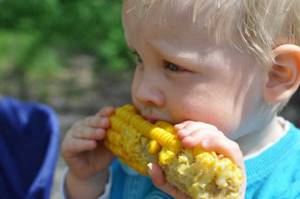
The daily norm of the product is 2-3 ears for an adult and 1 ear for a child over 6 years old.
Glycemic index of cooked corn
Corn itself is a very sweet product. Moreover, every year more and more new varieties are developed, in which the sugar content is constantly growing. All high-carbohydrate foods, including corn, also have a high glycemic index. On average, this figure for boiled corn is 82 units. But the sweeter the variety, the higher this indicator. Numbers for comparison: glycemic index of apple – 35, watermelon – 70, cucumber – 25.
What you need to know about the glycemic index? These are indicators of the speed with which the product is absorbed by our body and increases blood sugar levels. The GI scale ranges from 0 to 100. The higher the score, the stronger the glucose spikes. Foods with a high glycemic index are contraindicated for diabetics. But in general, GI is a useful indicator for people who follow a healthy diet.
We recommend reading: The benefits of mullet fish, how to choose and cook, where it is found
Is it possible to eat boiled corn while losing weight?
Nutritionists recommend that those losing weight include boiled ears of young corn in their daily diet . The product contains a lot of plant fiber, which, like a sponge, cleanses the digestive tract of waste and toxins and quickly removes excess fluid from the body. Manganese and B vitamins lower cholesterol levels, which improves digestion and helps regulate weight.

Weight loss also occurs due to the normalization of metabolic processes and activation of fat breakdown. Plant fiber saturates quickly and for a long time, the vitamin-mineral complex increases work capacity and physical activity, which leads to additional calorie burning.
Corn grains act as a mild natural laxative : they enhance intestinal motility, soften the consistency of stool, stimulate bowel movements, and reduce the time of bowel movement.
Advice. To increase the effectiveness of weight loss, it is recommended to take a tincture made from corn silk. The drink reduces appetite, reduces blood glucose levels, and increases the amount of urine excreted. To make the tincture, pour 200 g of dry stigmas into a thermos, pour in 500 ml of boiling water and leave for 4-5 hours. Take 100 ml half an hour before meals.
Corn Diet! Is it possible to lose weight quickly on corn? Easy and comfortable
Consumption standards
The permissible amount of cereal depends on age, health status and the presence of concomitant diseases . On average, a healthy person is allowed to eat 150 g of grains per day (this is one average ear). In the presence of risk factors, during breastfeeding and pregnancy, for children and the elderly, the norm is reduced to 2-3 ears per week.
It is better to eat corn at lunch , then it is well and completely absorbed by the body and does not cause a feeling of discomfort and heaviness in the stomach in the evening.
Combination with other products
Additionally, it is allowed to include almost all non-starchy vegetables in the diet (asparagus, cucumber, sweet peppers, onions, garlic, assorted greens, lettuce), unsweetened fruits, and low-calorie dairy products.
Boiled corn goes well with low-fat meats, fish, and other vegetables, steamed, oven-baked, or grilled without adding vegetable or cooking fats.
Boiled corn grains can be used as an ingredient in a diet salad, served with an omelet, or added to soup.
Storage conditions and periods
Boiled corn's calorie content, which makes it possible to quickly satisfy hunger, is recommended by nutritionists to combat excess weight. The product can be stored frozen, dried or canned. Fresh cobs can be stored at room temperature for no more than 3 days - then the grains begin to dry out and spoil.
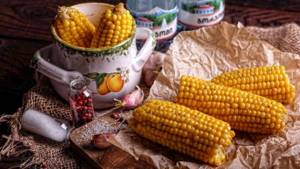
You can store cereal in the vegetable compartment of the refrigerator for up to 7 days, but you must first remove the leaves and panicles. The cobs should be kept in a plastic bag. Without the bag, corn will last no more than 3 days in the refrigerator. The product can last up to 12 months in the freezer, but to do this they need to be thoroughly rinsed, cleaned and placed in a bag or cling film.
Boiled cobs can also be placed in the freezer, where they can be stored for up to 8 months.
After preservation, grains can be stored for up to 3 years, which is often used by housewives. Opened jars should not be left in the refrigerator for more than 3 days - then it will begin to quickly deteriorate. It is not recommended to leave grains in a tin container - this will speed up the fermentation process. It is best to transfer the corn into a plastic container or glass jar.
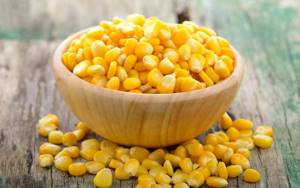
There is no need to drain the brine - its presence will extend the shelf life of the product. Boiled cobs at room temperature can be left for 10-12 hours, but they should lie in the broth in which they were cooked. Boiled cobs can be left in the refrigerator for 2-3 days, but also in broth.
The benefits and harms of boiled corn
The greatest value for the body is young ears of corn, collected in July-August . They contain the maximum amount of vitamins and minerals necessary for the body to maintain vital processes and produce energy.
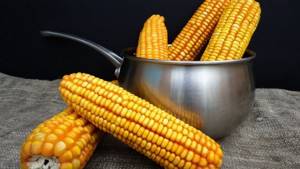
A properly grown vegetable without the use of nitrates has a diverse positive effect on the entire body, individual organs and organ systems :
- reduces cholesterol levels;
- improves the condition of the walls of blood vessels, increases their elasticity;
- supports normal functioning of the heart muscle;
- serves as a good prevention of atherosclerosis;
- produces a diuretic effect, removes waste and toxins from the intestines;
- cleanses the gallbladder and restores liver tissue;
- improves mood in people prone to depression;
- increases physical activity and endurance;
- normalizes night sleep;
- regulates energy metabolism;
- slows down the aging process;
- improves the condition of skin and hair;
- promotes the proper functioning of the nervous, endocrine, and digestive systems;
- Serves as a prevention of cancer.
Nutritionists classify boiled corn as a healthy food . However, in some cases, if used incorrectly or if there are contraindications, it can be harmful to health. Consumption of cereal crops with individual intolerance threatens an allergic reaction in the form of itching, peeling, skin rashes, and Quincke's edema.
In people prone to thrombophlebitis , it can worsen the prognosis and provoke an exacerbation of the disease. Corn suppresses appetite, which is unacceptable when the body is exhausted. Excessive consumption of boiled corn during breastfeeding can cause colic in the baby.
This is interesting:
An exotic vegetable with an amazing appearance - black corn
Colored corn - reality or photoshop
For children, men and women (including pregnant and lactating women)
Boiled corn is recommended for men as an additional source of zinc . It is necessary for sperm production and maintaining normal prostate function. Zinc is involved in the production of testosterone, the main male sex hormone responsible for the development of bone and muscle tissue, libido, sexual health, and maturation of follicles during ovulation.

Young boiled corn is especially useful for children . It contains potassium, which is necessary for normal formation and growth of bones and mineralization of teeth. Potassium maintains acid-base balance and water-salt balance. With its deficiency, disturbances in the functioning of the cardiac and skeletal muscles occur.
The complex of vitamins and minerals promotes the proper functioning of the nervous, digestive, endocrine, and cardiovascular systems, strengthens the immune system, and serves as a good prevention of influenza, ARVI, and acute respiratory infections.
In late pregnancy, nutritionists recommend limiting the consumption of boiled corn . But during breastfeeding, corn in moderate quantities is beneficial for a weakened female body. The product contains carbohydrates, which serve as a source of energy and take part in the regulation of osmotic pressure. The vitamin-mineral complex has a beneficial effect on the condition and functionality of the nervous, cardiovascular, and digestive systems.
For reference. Corn grains help normalize stool, activate intestinal motility, and facilitate bowel movements, which is extremely important for a woman during the postpartum period.
In addition, the cereal does not contain gluten, which means that the likelihood of an allergic reaction in a child is minimal . It is recommended to include boiled corn in the diet of a nursing woman, starting from the second to third month in the morning, in the amount of 50-70 g of boiled grains. If no adverse reactions are detected on the part of the child’s body, you can gradually increase the portion. You are allowed to eat no more than 2-3 cobs per week.
Menu for weight loss
A corn-based diet consists of consuming the product in different ways. Nutrition can be built on a strict regime, but for a short period of time. A longer-term method of losing weight proceeds with less rigor. Here the goal and the desired result are taken into account.
Diet for 3 days
This weight loss option is based on the consumption of corn with other vegetables. The menu does not change throughout the course, which makes it possible to quickly remove a certain amount of extra pounds. In summer you can use cobs, and in winter and spring you can use grains. Over the entire period, up to 4 kg of cereal crops will be required.
The menu for 3 days will look like this:
- for breakfast you need to boil 200 g of corn grains or 1 cob;
- for lunch, prepare a salad of tomatoes, grated cucumbers, carrots and lemon juice seasoning;
- dinner consists of boiled grains - 200 g.
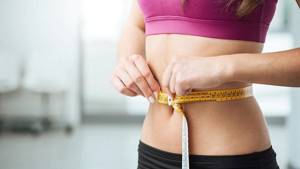
During the day you are allowed to drink water, a decoction of corn silk, herbal infusions and green tea. Liquids should be consumed up to 2-3 liters.
Losing weight in 4 days
This system is based on a slightly different menu, where for the first 2 days you need to eat up to 800 g of corn grains, and then gradually decrease to 400 g. Here the menu for each day has some differences. The diet is considered softer than the first.
Meals on the first day:
- breakfast will consist of a salad with grated carrots (1 piece), canned corn (200 g) and lemon juice dressing, and can be washed down with a glass of hot tea or coffee;
- for lunch you need to stew cabbage (200 g) with corn grains (200 g);
- in the afternoon it is recommended to eat 1 kiwi and 200 g of boiled cereal;
- dinner is presented with a salad made from 1 tomato, dill (50 g), grains (200 g), parsley (50 g) and arugula (150 g), and the dressing should be lemon juice.
The second day will consist of the following menu:
- For breakfast, prepare 1 medium cob in the oven or microwave;
- for lunch you should eat a salad with mushrooms and canned corn;
- for an afternoon snack you can take any unsweetened fruit;
- Dinner should be a salad of grated carrots (1 piece), canned corn (200 g) and lemon juice as a dressing.
The last 2 days are spent eating similar dishes:
- you need to have breakfast with a vegetable mix of Chinese cabbage (150 g), canned corn (100 g), ground pepper (7 g) and olive oil dressing;
- for lunch you need to prepare a soup from 2 tomatoes, celery (1/2 stalk) and grains (100 g);
- the afternoon snack is made from a boiled cob, half a grapefruit and an apple;
- you need to have dinner with a salad of Chinese cabbage (100 g), mushrooms (50 g), cucumber, boiled or canned corn (100 g), and the dressing is prepared from vegetable oil (10 ml), cranberry juice (10 ml) and basil (10 g ) with dill (10 g).
If you feel normal, you can extend the course of diets up to 7 days. But at the first signs of discomfort, you need to immediately stop losing weight or make it more gentle. After a diet course, you cannot immediately return to your usual diet - this will provoke a return to the previous kilograms. This result will lead to disappointment and depression.
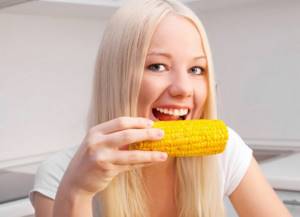
In order to enjoy the resulting effect for a long time, you should exit the diet correctly. The first day after the diet should consist of a small piece of cheese (20-50 g), which is eaten for breakfast, and for lunch you can cook 100 g of white poultry meat - chicken or turkey.
On the second day, it is allowed to introduce small amounts of fermented milk products - fermented baked milk, bifidokefir or yogurt. On the third day you can already consume 100-150 g of bread per day. Fatty foods should appear on the table only after 7-8 days.
Boiled corn is a product with a high content of vitamins and microelements, the calorie content of which allows you to make dietary dishes satisfying and healthy.
Nutritionists advise including this cereal in your weight loss menu, which helps maintain mineral balance. Plant fiber normalizes the functioning of the digestive and urinary systems, and this helps to get rid of excess weight and bad cholesterol in a short period of time.
Toxins are removed from the body, which results in improved well-being and general condition. Corn goes well with other products, which allows you to make your diet varied and complete.
Cooking recommendations
To prepare juicy and tasty corn, buy young ears . The ripening time for cereal crops is mid-July - late August. Pay attention to the grains: they should be milky white or light yellow in color (the older the corn, the brighter and more saturated the color of the grains), elastic, of the same size, tightly adjacent to each other, without signs of spoilage.
Advice. It is not recommended to buy corn cobs without leaves. Young corn has panicles at the tops and leaves that are fresh and green in color.
The most gentle option for cooking corn compared to boiling is steaming . With this method of culinary processing, the chemical composition remains practically unchanged, and the usefulness of the cereal for the body does not decrease.
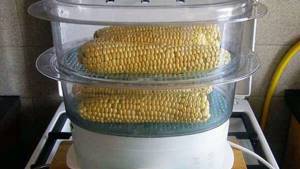
To steam corn using a slow cooker , you need to clean the cobs from leaves and panicles and rinse well under water. Next, pour 2 glasses of water into the main bowl, place a container for steaming on top, lay out the cobs, close the lid, and turn on the “steam” program.
Cooking time depends on the degree of maturity of the cereal: 10-15 minutes for young grains, 25-30 minutes for more mature ones.
There are general recommendations and life hacks on how to cook tasty and healthy corn.:
- Before cooking, soak de-leafed corn in cold water for an hour to soften the kernels.
- You can boil corn with leaves, after removing the panicles on the tops, which will make the product more aromatic and juicy.
- Cook corn without adding salt to the water, as salt makes the grains harder. Salt ready-made hot corn if desired. When following a dietary regimen, it is better to limit salt, as it retains fluid, disrupts the water-salt balance, which slows down the process of losing weight.
- The optimal cooking time for young grains is no more than 20 minutes, for overripe ones - 2-2.5 hours. Check readiness with a skewer or taste it.
- To ensure the corn cooks evenly, choose cobs that are the same size. If the cobs are large, cut them in half before cooking.
- Overripe grains will be soft and juicy if you first soak them in cold water with milk in a 1:1 ratio for 4-5 hours. Then cook in the usual way.
- For cooking over a fire, use a cast iron pan with thick walls and a bottom. Cook with the lid closed.
- You can cook corn in a microwave, double boiler, or bake in the oven.
- Place the cobs in boiling water.
- During the cooking process, add a pinch of sugar and 10-20 g of butter to the water. The grains will be more juicy and tender.
- It is better to eat corn hot, as it becomes hard as it cools.
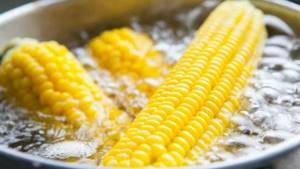
Calorie content of corn depending on cooking method
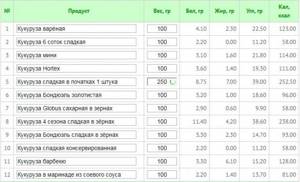
Culinary processing changes the ratio of BJU and calorie content of food. Additional ingredients have the biggest impact. Here are the basic tips:
- Boiling the product with or without salt does not affect the nutritional value in any way, since salt itself has zero KBJU. It is believed that cooking in brackish water makes the corn kernels harder. But this is only true for old, fodder crops.
- If you put sugar in water, the amount of carbohydrates will increase and the calorie content will be higher.
- When grilled or baked in the oven, the cobs are brushed with oil. Even a small addition of fat causes calories to increase to 106 kcal per 100 g.
- Freezing does not affect the nutrient content. After defrosting, the product may seem slightly watery, but all valuable components will be preserved.
- Canning seems to help produce a low-calorie product. But this only seems so at first glance. The Bonduelle label states that 100 g contains only 56 kcal. But these are grains along with filling that no one eats. The corn itself in the jar is only 60%. If you recalculate, the calorie content of canned grains without marinade is equal to 93 kcal, which is practically no different from home-cooked grains. But this is still not a high-calorie product.
The most high-calorie
But what you really should be wary of are processed products from corn flour or cereals with a lot of sugar. The record holder for energy value is glazed flakes with 360 kcal per 100 g.
Also, due to the high carbohydrate content, especially starch, you should not buy old feed corn. Its calorie content is 365 kcal. Not only is the product “heavy” for the stomach, it is also hard, not tasty, and takes a long time to cook.
Contraindications
An absolute contraindication to boiled corn is individual intolerance to the component(s) of the composition. It is recommended to partially or completely limit the product if you have diseases such as :
- increased blood clotting;
- thrombophlebitis;
- anemia;
- diabetes;
- diseases of the gastrointestinal tract during exacerbation.
Elderly people and children, during pregnancy and breastfeeding are advised to eat with caution.
Calorie content of 1 cob
In order for a diet to help you lose extra pounds and not harm your health, you should pay special attention to the products that will be included in it. There are entire unloading systems for maize, during which you can only eat this grain crop.
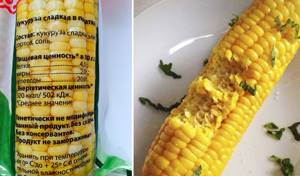
The average calorie content of boiled corn per 100 grams, which is cooked in water with salt, is about 96 kcal. This only applies to the edible part.
To understand the nutritional value of a boiled cob, it is worth performing some calculations:
- the weight of an ordinary head of cabbage ranges from 250 to 300 grams;
- the third part is occupied by the inedible stalk, which means that the mass of edible grains is 170-200 grams;
- As a result, 1 cob of boiled corn contains 160-192 kcal.
But if we look at reference literature and cookbooks, they may contain different caloric content indicators - from 80 to 123 kcal. There are different varieties of cereal crops, heads of cabbage may have different maturity, and all this can affect the nutritional value.
